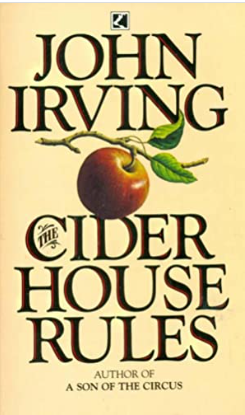Post: August 29, 2022
The Cider House Rules

The book's message to me is that nothing is black and white. It tells me to be careful of value judgments because life is complicated and intricate and no, we don't understand, we really don't. The truth is intimate and personal and the outward form of relationships and situations do not necessarily reflect the internal truth. So be careful of judgments.
I am now old enough to appreciate John Irving's writing, this writing that once baffled me and which I considered weird. I now realize that I reacted this way to Irving's writing style as a form of rejection.
John Irving has a melancholy, world-weary way of telling a tale. Life is an asshole and John Irving knows it, you sense he knows it, you sense that things can go very, very wrong in his story, and he'll let it, because he knows life is an asshole, and he'll tell it straight, and it's all so very exciting to read.
The young me rejected this writing because I was so full of hope then and I could not abide sadness in my books. It is for the same reason that, when reading "The Lord of the Rings", I found the sections describing Sam and Frodo's journey as "boring". It wasn't boring, it was hard and miserable, and I didn't like hard and miserable in my books when I was young and thought myself invincible and immortal and a bright future lay ahead of me.
Now I am old and life has broken me several times. I have lived long enough to derive comfort and solace from somber works like "The Cider House Rules". I don't remember a thing about "The World According to Garp" but I'm interested to give it a another read; the same with John Irving's other works - I am now at an age that I am ready for this author and appreciate him for the excellent writer that he is.
I like living vicariously through the characters I read about in fiction. Through them I expand my life experience, doing and thinking things that I normally would not be able to do with this one life and singular self.
In the pages of "The Cider House Rules" I am Dr. Wilbur Larch from his youth to his old age; I know what it is like to wrestle with the moral challenges of abortion, to be an expert in a field of medicine, to run a place like St. Cloud's Orphanage.
I am Nurse Edna and Nurse Angela, working at St. Cloud's day in and day out, enjoying and finding a life in the routine. I am Melony, angry at the world. I am Candy and Wally, young and privileged, kind and brave. I am Rey Kendall, the mechanical genius who can fix anything and improve any machine. I am Senior, at the end of my days struggling with a foe I cannot see and a life that is collapsing under me.
I am Homer Wells, the orphan, the obstetric genius, the lost boy, the spiritual son of Wilbur Larch. Competent, easy-going, level headed Homer, who, even in his youth, was always wise enough not to swim against the current of life but just go with the flow, but having the guts to make a course correction when needed.
In these pages I get to live at St. Cloud's Orphanage. I get to do the rounds of the boys and girls departments, sit down at the office, walk the grounds, go to the nearby rail station. Along the way I learn about orphanages, obstetric procedure, and ether. I get to live and work at Ocean View Orchards and learn the hundred and one things it takes to run an apple farm.
The two best characters in this book for me are Dr. Wilbur Larch and Melony. I consider Wilbur Larch a deeply lucky individual in that, to Dr. Larch, there is no difference between work, life, and passion. This man has lived his life his way; how many of us will be able to say the same at the end? I certainly won't.
Melony is troubled and dangerous and quite a punk but at her core is this integrity that allows her to see things with brutal clarity. It is upon meeting Melony that Homer - well, I won't go into that. That's a spoiler. Let's just say that Melony is the uncompromising spirit of honesty that we all need to be confronted with from time to time.
I found "The Cider House Rules" to be masterfully written. So rich that I could not read through it for long stretches of time. The book is composed of eleven long chapters. After I read a chapter I would close the book and come back to the it a day or two later.